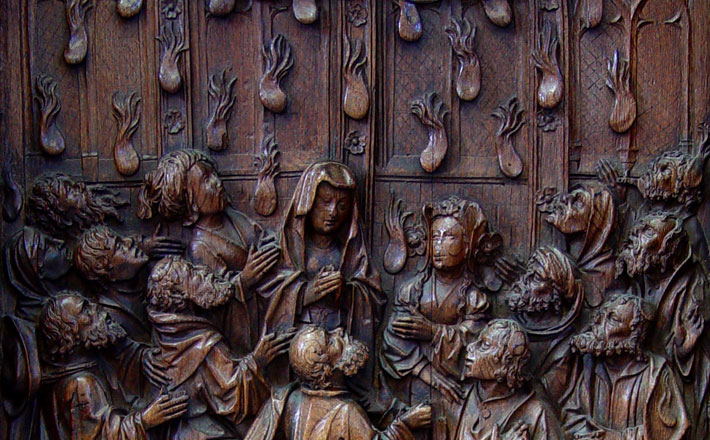Commentary on Romans 8:22-27
The reason that this passage appears in the lectionary at this point is obvious.
It is an epistolary text that speaks of the activities of the Holy Spirit. There are of course other passages that do that, such as those that speak of the gifts of the Spirit (Romans 12:4-8; 1 Corinthians 12:1-11; Ephesians 4:1-13). In fact, since it is Pentecost, the lectionary could arguably include a passage on glossolalia (e.g., 1 Corinthians 14:1-25 or portions of it). But actually that would undercut the story of Pentecost itself, which was a communication event for all those present, whereas glossolalia requires interpretation (1 Corinthians 14:1-5, 13, 27-28). Instead we have a passage that sets the work of the Spirit within cosmic redemption, the prayers of believers, and the inner life of the triune God.
The passage fits into a chapter that heralds the good news that those who are in Christ are free from condemnation, as set forth in the very first verse (Romans 8:1). Paul goes on from there in the chapter to write concerning the new life in the Spirit, which is a life under the leadership of that Spirit. But while doing so, Paul also speaks of the solidarity of the believer with Christ, and that is a life that can include suffering (8:17). In fact, he says, the entire creation suffers in the present era (8:18-19), for it was subjected to futility by God (an allusion to the curse of Genesis 3:17) and therefore shares in the fallen state of humanity. But that does not mean for a moment that God has abandoned the creation, for it was subjected by God in hope that in due course it “will be set free from its bondage to decay and will obtain the freedom of the glory of the children of God” (8:21). Our passage begins with the next verse.
In Romans 8:22-23, Paul uses an interesting, memorable, and striking metaphor. Presently the whole creation, he says, groans in labor pains; its condition is like a woman giving birth to a child. Something is about to happen, an outcome. But for now there is waiting. In God’s own time the entire creation will share what Christians have now — adoption by God and transformation into a new status, redemption. The phase “redemption of our bodies” signifies an eschatological renewal of ourselves in our totality, including our bodily existence.
In Romans 8:23 he says we have the “first fruits of the Spirit.” The Greek term for “first fruits” (aparche) is a cultic one, used in both pagan Greek sources and in the Septuagint (Exodus 23:19; 25:2-3; Leviticus 22:12), referring to either agricultural produce or animals presented to God and consecrated before the rest of a crop or herd could be put to use. In the present context Paul is saying that believers have already the first installment of what is to come. They experience proleptically that which is in store for the entire creation.
In Romans 8:24-25 Paul expands on the situation of the believer. He declares that “in hope we were saved.” This is the only time Paul speaks in his letters of being saved as a past event. But it is possible for him to do so, for God’s saving action in Christ has taken place already. But, to be sure, it is not yet fully realized; its full effects remain a future hope, something not yet seen. And we must wait for that patiently.
The following brief paragraph (Romans 8:26-27) continues the overall theme of the chapter, life in the Spirit, and about prayer in particular. The verses presuppose that believers in Christ, worn down by weakness and the groaning of creation, are spiritually impoverished and are unable to pray in a proper way. Help from the Holy Spirit is needed. But what is striking is what Paul does not go on to say at this place. He does not say that the Spirit empowers us to pray. Instead, he says, the Spirit intercedes for us “with sighs too deep for words” (a more literal translation would be: “with inexpressible groanings”). The intercessions, being inexpressible, are not heard, for they take place within the larger life of God, “who searches the heart” and “knows what is the mind of the Spirit.” The whole emphasis is on God from start to finish. God the Spirit helps us in our spiritual poverty, interceding for those in Christ, and God the Father hears the prayers uttered by the Spirit. There is here an intimation, or at least an anticipation, of a doctrine of the triune God. Later on Paul adds that Christ himself intercedes for the saints (8:34) as well.
This text, in conjunction with the other readings for the day, provides for the preacher and the congregation a wide arena for celebrating the Holy Spirit and its work. First, there is the story of Pentecost, which is the reason for the day and the centerpiece of the readings, even if it is read first. The Psalm (104:24-34, 35b) speaks eloquently of the Spirit in creation and renewal of it. And in the Gospel for the Day (John 15:26-27; 16:4b-15) Jesus promises to send the Spirit (the Advocate), and he says that the Spirit will testify of him and guide the community of believers “into all the truth.” The Second Lesson (Romans 8:22-27) relates most directly to the Psalm in affirming that the Spirit is involved in the renewal of creation, but goes its own way when it takes up the role of the Spirit in prayer. The point should be clear: there is a lot more in the texts for Pentecost than what is told in the second chapter of Acts, even though the drama of Acts is hardly matched by the other readings.
The text from Romans is unique within the New Testament concerning the creation. When biblical texts relating to environmental concerns are sought, the most fruitful place to look is the Old Testament (e.g., Genesis 1:1-2:25; Job 38-39; Psalms 8; 104; 145-147; Joel 1:1-20). But Romans 8 needs to be added to the list as well. There we have one of the most sensitive discussions within all of Scripture concerning the plight of the creation. The creation is in a sorry state. It is groaning, and its groans are like that of a women in labor. That is not all, of course. During her groaning a mother-to-be looks forward with eager anticipation for the delivery to occur. That will mean the end of suffering, and it also means a gift of new life for both her and the child. What is also important in the passage is the clear affirmation that God cares deeply about the creation. God has not abandoned it. And since that is so, the Christian community cannot turn away from it in favor of an apocalyptic rescue operation, ignore it, or destroy it. On the contrary, the Christian community is bound to care for it. Our expectation of a new creation in God’s good time does not negate the importance of the creation we have. We do not seek to escape from the creation; we affirm a common destiny with it. It is our home.
The second paragraph of the reading (Romans 8:26-27) is truly inspiring and can be good news. It is true for most Christians that they do not know how to pray as they ought. The good news is that, regardless of that, the Spirit is also at prayer within the inner life of God, interceding for them. That does not mean that Christians should therefore stop praying and let the Spirit do all the praying for them. Paul assumes that believers will continue to pray, even if their prayers seem inadequate. But even though prayers by believers seem to be halting, and so much is left out, the Spirit is boundless, active, and gracious, picking up where we need help.


May 24, 2015